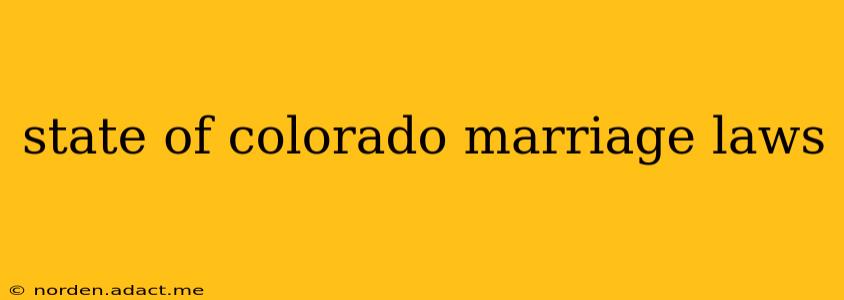Getting married in Colorado? Understanding the state's marriage laws is crucial for a smooth and legally sound process. This guide covers the essential aspects of Colorado marriage laws, answering common questions and providing clarity on the requirements and procedures involved.
What are the requirements to get married in Colorado?
To legally marry in Colorado, both individuals must meet several requirements:
- Age: Both parties must be at least 18 years old. Those under 18 may marry with parental consent and a court order.
- Identity: Valid government-issued photo identification is required for both individuals. This proves legal identity and age.
- Capacity: Both individuals must be of sound mind and capable of understanding the marriage contract. This means they can't be under the influence of drugs or alcohol to the point of impairment, and they must understand the legal implications of marriage.
- No existing marriage: Neither party can be currently legally married to someone else. Bigamy is illegal in Colorado.
- Consent: Both individuals must freely and voluntarily consent to the marriage. This consent cannot be coerced or forced.
What documents are needed to get married in Colorado?
While Colorado doesn't mandate specific pre-marital documentation, having certain documents on hand simplifies the process:
- Valid photo ID: As mentioned, this is crucial for verifying identity and age.
- Proof of residency (if applicable): Depending on where the marriage license is obtained, you may need to provide proof of residency in Colorado.
- Birth certificates (if applicable): Some officiants may request these as verification.
Where can I get a marriage license in Colorado?
Marriage licenses are obtained through the county clerk and recorder's office in the county where one of the applicants resides. Each county has its own specific processes and fees, so it's important to contact the relevant county office directly.
How long is a Colorado marriage license valid for?
Colorado marriage licenses are typically valid for a specific period, usually 60 days. This timeframe begins from the date the license is issued. The license must be used within this timeframe; otherwise, it expires, and a new license must be obtained. Always confirm the exact validity period with the issuing county clerk and recorder’s office.
What are the waiting periods for a marriage license in Colorado?
Colorado does not impose a mandatory waiting period between applying for and receiving a marriage license. You can typically obtain your license on the same day you apply, though county offices might vary slightly in processing times.
Who can perform a marriage ceremony in Colorado?
Colorado law authorizes several individuals to perform marriage ceremonies:
- Officially ordained ministers: This includes ministers of various religious faiths.
- Judges: Judges of state and federal courts can officiate.
- Notaries Public: Colorado has authorized notaries public to perform marriages.
- Other authorized officials: In some cases, other designated public officials may be authorized to perform weddings.
Can I get married in Colorado if I'm not a resident?
Yes, you absolutely can. Colorado welcomes couples from all states and countries to get married within its borders, as long as you meet all the legal requirements.
What is the process for getting a marriage license in Colorado?
The exact process can vary slightly by county. Generally, the process includes:
- Applying in person: Both individuals must apply together at the county clerk and recorder's office.
- Providing identification: Present your valid photo identification.
- Paying the fee: Pay the required marriage license fee.
- Receiving the license: The license will be issued once the application is processed and the fee is paid.
- Having your ceremony: Use the license within the specified validity period to have your wedding ceremony.
- Returning the signed license: The officiant will complete the license and return it to the county clerk and recorder's office. This is typically done within 60 days.
This guide provides a general overview. Always consult the specific county clerk and recorder's office in the county where you plan to marry for the most up-to-date information and precise requirements. Remember that marriage laws are subject to change, so confirming details directly with the relevant authorities is always recommended.
